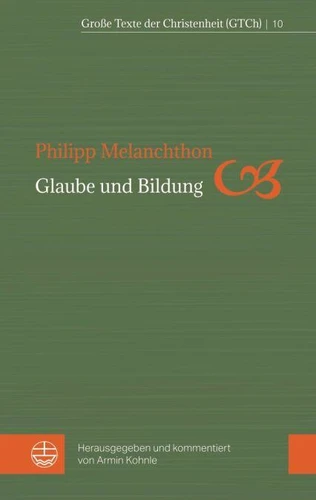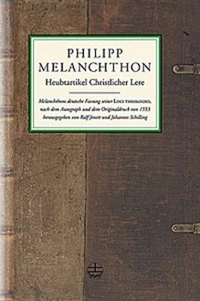Glaube und Bildung
Par : ,Formats :
Disponible dans votre compte client Decitre ou Furet du Nord dès validation de votre commande. Le format PDF est :
- Compatible avec une lecture sur My Vivlio (smartphone, tablette, ordinateur)
- Compatible avec une lecture sur liseuses Vivlio
- Pour les liseuses autres que Vivlio, vous devez utiliser le logiciel Adobe Digital Edition. Non compatible avec la lecture sur les liseuses Kindle, Remarkable et Sony
 , qui est-ce ?
, qui est-ce ?Notre partenaire de plateforme de lecture numérique où vous retrouverez l'ensemble de vos ebooks gratuitement
Pour en savoir plus sur nos ebooks, consultez notre aide en ligne ici
- Nombre de pages144
- FormatPDF
- ISBN978-3-374-06844-9
- EAN9783374068449
- Date de parution01/03/2021
- Protection num.Digital Watermarking
- Taille920 Ko
- Infos supplémentairespdf
- ÉditeurEvangelische Verlagsanstalt
Résumé
In der Geschichte des christlichen Denkens kommt Philipp Melanchthon (1497-1560) durchaus eigenständige Bedeutung zu. Zwar lernte er seine Theologie von Martin Luther, er verband sie jedoch mit der zweiten großen Denkströmung seiner Zeit, dem an der griechisch-römischen Antike orientierten christlichen Humanismus. Glaube und Bildung waren die beiden großen Lebensthemen des Reformators und Bildungsreformers Melanchthon.
Die drei für die "Großen Texte der Christenheit" ausgewählten Schriften illustrieren Melanchthons Bildungsprogramm (Wittenberger Antrittsrede 1518), stellen ihn als evangelischen Theologen vor (Eine Summe der Christlichen Lehre an den Landgrafen von Hessen 1524) und thematisieren das für den Erfolg der Wittenberger Reformation so grundlegende Verhältnis zu Luther (Grabrede 1546). [Philip Melanchthon.
Faith and Education] In the history of Christian thought, Philipp Melanchthon (1497-1560) is of quite independent significance. Although he learned his theology from Martin Luther, he combined it with the second great current of thought of his time, Christian humanism, which was oriented on Greek-Roman antiquity. Faith and education were the two great life themes of the reformer and educational reformer Melanchthon.
The three writings selected for the "Great Texts of Christianity" illustrate Melanchthon's educational program (Wittenberg Inaugural Speech 1518), introduce him as a Protestant theologian (A Sum of Christian Teaching addressed to the Landgrave of Hesse 1524), and address the relationship to Luther that was so fundamental to the success of the Wittenberg Reformation (Funeral Speech 1546).
Die drei für die "Großen Texte der Christenheit" ausgewählten Schriften illustrieren Melanchthons Bildungsprogramm (Wittenberger Antrittsrede 1518), stellen ihn als evangelischen Theologen vor (Eine Summe der Christlichen Lehre an den Landgrafen von Hessen 1524) und thematisieren das für den Erfolg der Wittenberger Reformation so grundlegende Verhältnis zu Luther (Grabrede 1546). [Philip Melanchthon.
Faith and Education] In the history of Christian thought, Philipp Melanchthon (1497-1560) is of quite independent significance. Although he learned his theology from Martin Luther, he combined it with the second great current of thought of his time, Christian humanism, which was oriented on Greek-Roman antiquity. Faith and education were the two great life themes of the reformer and educational reformer Melanchthon.
The three writings selected for the "Great Texts of Christianity" illustrate Melanchthon's educational program (Wittenberg Inaugural Speech 1518), introduce him as a Protestant theologian (A Sum of Christian Teaching addressed to the Landgrave of Hesse 1524), and address the relationship to Luther that was so fundamental to the success of the Wittenberg Reformation (Funeral Speech 1546).
In der Geschichte des christlichen Denkens kommt Philipp Melanchthon (1497-1560) durchaus eigenständige Bedeutung zu. Zwar lernte er seine Theologie von Martin Luther, er verband sie jedoch mit der zweiten großen Denkströmung seiner Zeit, dem an der griechisch-römischen Antike orientierten christlichen Humanismus. Glaube und Bildung waren die beiden großen Lebensthemen des Reformators und Bildungsreformers Melanchthon.
Die drei für die "Großen Texte der Christenheit" ausgewählten Schriften illustrieren Melanchthons Bildungsprogramm (Wittenberger Antrittsrede 1518), stellen ihn als evangelischen Theologen vor (Eine Summe der Christlichen Lehre an den Landgrafen von Hessen 1524) und thematisieren das für den Erfolg der Wittenberger Reformation so grundlegende Verhältnis zu Luther (Grabrede 1546). [Philip Melanchthon.
Faith and Education] In the history of Christian thought, Philipp Melanchthon (1497-1560) is of quite independent significance. Although he learned his theology from Martin Luther, he combined it with the second great current of thought of his time, Christian humanism, which was oriented on Greek-Roman antiquity. Faith and education were the two great life themes of the reformer and educational reformer Melanchthon.
The three writings selected for the "Great Texts of Christianity" illustrate Melanchthon's educational program (Wittenberg Inaugural Speech 1518), introduce him as a Protestant theologian (A Sum of Christian Teaching addressed to the Landgrave of Hesse 1524), and address the relationship to Luther that was so fundamental to the success of the Wittenberg Reformation (Funeral Speech 1546).
Die drei für die "Großen Texte der Christenheit" ausgewählten Schriften illustrieren Melanchthons Bildungsprogramm (Wittenberger Antrittsrede 1518), stellen ihn als evangelischen Theologen vor (Eine Summe der Christlichen Lehre an den Landgrafen von Hessen 1524) und thematisieren das für den Erfolg der Wittenberger Reformation so grundlegende Verhältnis zu Luther (Grabrede 1546). [Philip Melanchthon.
Faith and Education] In the history of Christian thought, Philipp Melanchthon (1497-1560) is of quite independent significance. Although he learned his theology from Martin Luther, he combined it with the second great current of thought of his time, Christian humanism, which was oriented on Greek-Roman antiquity. Faith and education were the two great life themes of the reformer and educational reformer Melanchthon.
The three writings selected for the "Great Texts of Christianity" illustrate Melanchthon's educational program (Wittenberg Inaugural Speech 1518), introduce him as a Protestant theologian (A Sum of Christian Teaching addressed to the Landgrave of Hesse 1524), and address the relationship to Luther that was so fundamental to the success of the Wittenberg Reformation (Funeral Speech 1546).









